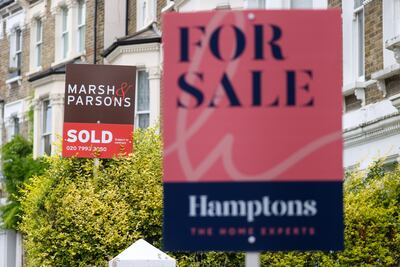UK house prices have started to fall again, after a brief recovery in April, according to the latest figures from Nationwide.
The building society's house-price index showed that prices fell by 0.1 per cent month on month in May after a 0.4 per cent increase in April.
Annually, property prices fell by 3.4 per cent in May, compared with the 2.7 per cent decrease in the previous month.
“This largely reflects base effects, with prices broadly flat over the month after taking account of seasonal effects,” said Robert Gardner, the chief economist at Nationwide.
“Average prices remain 4 per cent below their August 2022 peak.
“Recent Bank of England data had shown some signs of recovery in housing market activity, although the number of mortgages approved for house purchases in March was still around 20 per cent below pre-pandemic levels.”
Inflation, interest rates and other worries
With inflation still high, bond yields rose last week, meaning lenders increased mortgage rates amid expectations that the Bank of England would be open to raising interest rates in the future.
“Headwinds to the housing market look set to strengthen in the near term,” Mr Gardner said.
“While consumer price inflation did slow in April, it was a much smaller decline than most analysts had expected.
“As a result, investors’ expectations for the future path of the bank rate increased noticeably in late May, suggesting it could peak at 5.5 per cent, well above the 4.5 per cent peak that was priced in around late March.
“Rates are also projected to remain higher for longer.”

'From relative stability to wild instability within the blink of an eye'
Ross McMillan of Blue Fish Mortgage Solutions said: “May started encouragingly and then swerved violently in the past week or so from relative stability to wild instability.
“How this recent shock to borrowers' systems impacts the overall housing market in the near future is difficult to gauge but anecdotally, appetite from first-time buyers, in particular, remains stubbornly strong so far.”
Economists had been expecting a slight rise in the monthly figure and still expect a “soft” landing for the housing market, rather than a crash.
“Looking ahead, house price falls have been relatively gentle so far, but the rumblings in the mortgage market signal challenges to come,” said Alice Haine, personal finance analyst at Bestinvest.
“Households have already faced a barrage of bill shocks since the great financial squeeze reared its ugly head more than 18 months ago.
“Now, as the economy transitions from a cost-of-living crisis to a cost-of-borrowing crisis, it appears there is more pain in store for buyers and sellers alike.”
“The headwinds the Nationwide refers to have definitely picked up over the course of the past week,” said Riz Malik, of R3 Mortgages, an independent home loan broker.
“The current mortgage market volatility we have that was sparked by the inflation data could restrain property transactions moving forward, with rising rates potentially deterring buyers.”
James Forrester, managing director of Birmingham and Lichfield-based estate agent Barrows and Forrester, said: “Those sitting on the fence in anticipation of a return to the pandemic glory days of double-digit price growth will be sitting for some time.
“However, the outlook is broadly positive and while a natural correction was always likely, we are yet to see any inkling of a market crash.”
Mortgage approvals decline
Meanwhile, figures from the Bank of England showed net mortgage approvals for house purchases fell from 51,500 in March to 48,700 in April.
The drop was not expected by economists, who had predicted a rise to 53,000.
The Bank of England also said that the ‘effective’ interest rate, which is the actual interest rate paid by borrowers to lenders, on newly drawn mortgages rose by 0.5 per cent to 4.46 per cent in April.
“The stark reality is owning a home appears to be a distant dream for many, with high mortgage rate rates, high property prices and a higher cost of living, including climbing rents, making buying a home an increasingly difficult prospect,” said Myron Jobson, a senior personal finance analyst at Interactive Investor.


